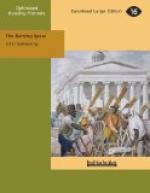At the far end, under an acacia, Mrs. Sinkin could see the form of a young lady in a blue dress, lying in a hammock, with a cigarette between her lips and a yellow book in her hands. She approached her thinking, “Dear me! how comfortable, in these days!” And, putting her head a little on one side, she said with a smile: “My name is Sinkin. I hope I’m not disturbing you.”
The young lady rose with a vigorous gesture.
“Oh, no! Not a bit.”
“I do admire some people,” said the old lady; “they seem to find time for everything.”
The young lady stretched herself joyously.
“I’m taking it out before going to my new hospital. Try it,” she said touching the hammock; “it’s not bad. Will you have a cigarette?”
“I’m afraid I’m too old for both,” said the old lady, “though I’ve often thought they must be delightfully soothing. I wanted to speak to you about your neighbour.”
The young lady rolled her large grey eyes. “Ah!” she said, “he’s perfectly sweet.”
“I know,” said the old lady, “and has such a dear dog. My nephew’s very interested in them. You may have heard of him—Wilfred Sinkin—a very clever man; on so many Committees.”
“Not really?” said the young lady.
“Oh, yes! He has one of those heads which nothing can disturb; so valuable in these days.”
“And what sort of a heart?” asked the young lady, emitting a ring of smoke.
“Just as serene. I oughtn’t to say so, but I think he’s rather a wonderful machine.”
“So long as he’s not a doctor! You can’t think how they get on your nerves when they’re, like that. I’ve bumped up against so many of them. They fired me at last!”
“Really? Where? I thought they only did that to the dear horses. Oh, what a pretty laugh you have! It’s so pleasant to hear anyone laugh, in these days.”
“I thought no one did anything else! I mean, what else can you do, except die, don’t you know?”
“I think that’s rather a gloomy view,” said the old lady placidly. But about your neighbour. What is his name?”
“Lavender. But I call him Don Pickwixote.”
“Dear me, do you indeed? Have you noticed anything very eccentric about him?”
“That depends on what you call eccentric. Wearing a nightshirt, for instance? I don’t know what your standard is, you see.”
The old lady was about to reply when a voice from the adjoining garden was heard saying:
“Blink! Don’t touch that charming mooncat!”
“Hush!” murmured the young lady; and seizing her visitor’s arm, she drew her vigorously beneath the acacia tree. Sheltered from observation by those thick and delicate branches, they stooped, and applying their eyes to holes in the privet hedge, could see a very little cat, silvery-fawn in colour and far advanced in kittens, holding up its paw exactly like a dog, and gazing with sherry-coloured eyes at Mr. Lavender, who stood in the middle of his lawn, with Blink behind him.




